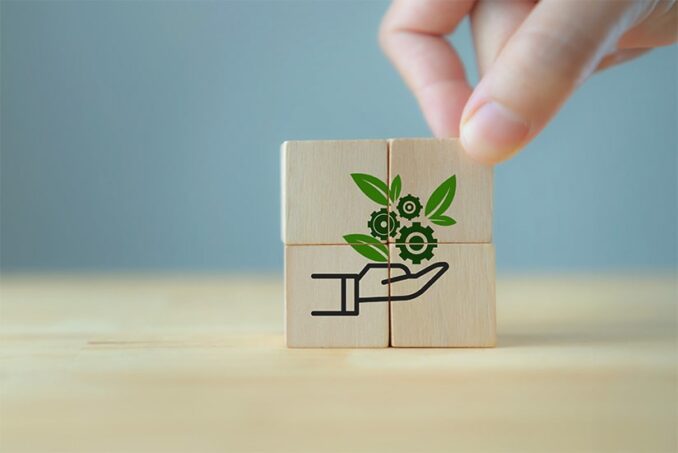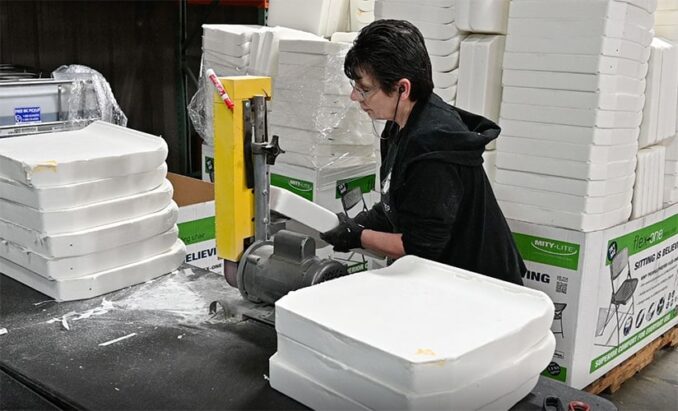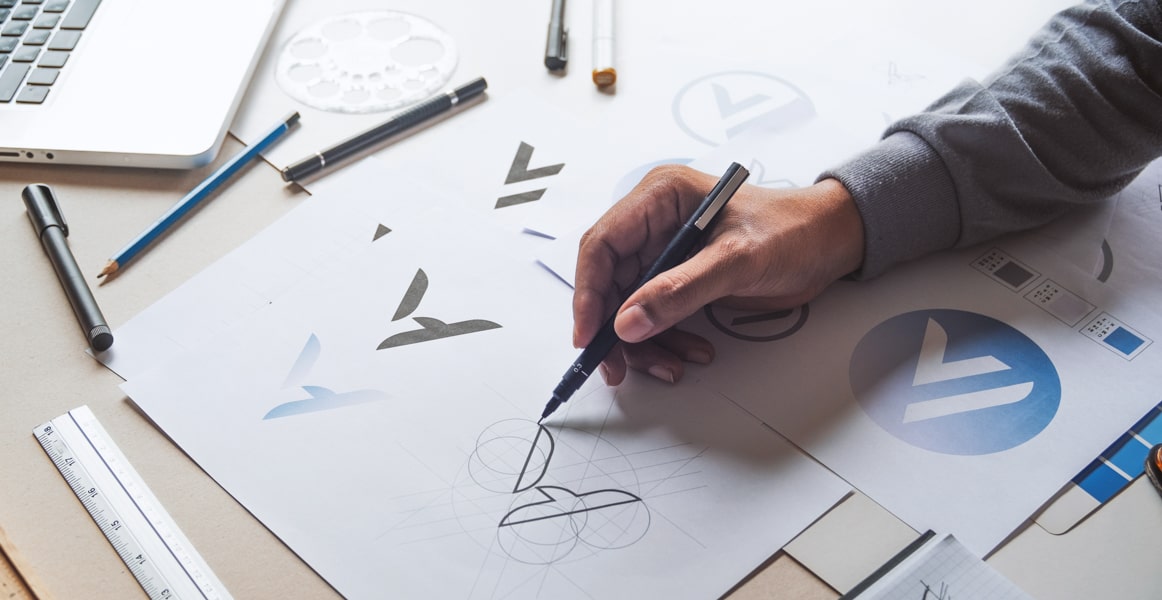Bertolini’s custom church chairs are built with locally sourced materials. The 16-gauge cold-rolled steel chair frames are produced from 100% recyclable steel and have a 20–25-year warranty. This durable frame configuration will last twice as long as other frames, supporting sustainability by lengthening the product’s life cycle.
- Impressions Chair: GREENGUARD Certification
- FormFlex™ Seat Base
- Recyclable Foam
- Zero Emission Coating Process
- Reduced Packaging Waste
GREENGUARD Certified
The Impressions Church Chair by Bertolini is made in the USA and is GREENGUARD Certified by the GREENGUARD Environmental Institute, which means it has passed rigorous third-party tests to ensure it does not off-gas harmful chemicals.
Recyclable Seat Base
The Impressions church chair features our patented FormFlex™ seat base for boosted comfort during worship services and church events. This high-quality, molded plastic seat base also increases the product life. Our Millennia and Essentials Worship Chairs are built with plywood seat bases, which are also fully recyclable. All our seat bases support 1,000 pounds (453.5 kg), which supports sustainability by extending the life of the chair.
Recyclable Foam
For our Impressions Chair, we use high resilience, cold cure, flex-molded foam. It is fully recyclable and will last over 25 years, contributing to the long product life.
Zero Emission Coating Process
Bertolini does not use electroplating for chair finishes because of the environmental dangers of plating (which include toxic air pollution). Instead, Bertolini offers a more environmentally friendly powder coated steel frame finish, which lasts longer and is safer. At Bertolini, we use a state-of-the-art, electrostatic, powder coat system that is self-contained and has zero emissions and zero environmental impact.
Reduced Packaging Waste
We have reduced cardboard in our church chair packaging by eliminating the need for fully enclosed boxes in most deliveries. Chairs are delivered in custom shrink-wrapped protection stacks to reduce the environmental impact of packaging.
Bertolini’s Commitment to Sustainability Includes:
Carbon Footprint
- Our policy for shipping is to consolidate loads to reduce energy consumption.
- Steel, poly, and wood are locally sourced for our facility
Recycle Programs
- We recycle all steel, corrugated plastic, and wood at our facility.
- Approximately 49% of a standard chair by weight is built with materials which contain recycled components.
- 100% of a Bertolini chair can be taken apart and recycled into other products.
In Progress Sustainability Initiatives:
Supplier Sustainability Profiles
- We survey our suppliers to learn about their sustainability initiatives and, whenever possible, choose to partner with sustainable minded suppliers when making decisions on purchasing products and raw materials.
Environmental Policy
- It’s the policy of Bertolini to support continuous improvement in all aspects of business, including caring for the environment.
Administration, Sales & Marketing Departments
- Continue developing methods of using less paper to accomplish work.
- Maintain room temperature at minimum comfort levels, not to over cool or overheat areas.
- Set up HVAC systems to ensure that units are not in use when the office and buildings are vacant.
- Turn off lights when not needed.
Production & Product Development Departments
- Continue to improve efficiencies so that more products can be made in less time, saving labor and energy.
- Continue to improve product quality to prevent the additional shipping of repair parts.
- Continue developing methods of using less paper to accomplish work.
- Continue to reduce scrap.
- All scrap steel will be inspected and approved by the department supervisor prior placement in the recycle container. This is to insure reworking the part is not possible.
- All scrap cardboard from packaging will be a) placed in a recycle container b) if applicable given to shipping for repackaging components.
- All scrap powder will be used on non-color sensitive components and products.
- All scrap olefin fabrics will be placed in a recycle container.
- General facility lighting will only be used as needed.
- Establish quarterly goals for each employee.
Shipping Department
- Reduce carbon footprint by consolidating loads.
- Develop freight lanes to improve load chair count.
Recycle Program
The Bertolini recycling program continues to expand as knowledge and technology advances. This program includes recycled materials purchased and used in the product (pre-production recycling) as well as materials recycled after production (postproduction recycling). In addition, Bertolini offers employees the ability to recycle home materials if they don’t have a recycling program at home.

Pre-Production Recycling Program
Steel:
- Steel tubing used in Bertolini chair frames contains an average of 23% post-consumer recycled steel. This represents approximately 25% of the weight of a standard chair.
- Steel tube yield is very high because it’s cut to size at the mill which eliminates waste caused by different lengths required to build chairs.
Plastic:
- Our ABS plastic used in manufacturing chair backs and seat bases contains 80% recycled material or “regrind.” This represents approximately 14% of the weight of an average chair. Leftover ABS scrap material from molded backrests is also recycled.
Wood:
- Plywood seat bases are used on some models where plastic is not used. Our plywood is made of recycled scraps of a renewable resource (wood).
Fabrics:
- Polyolefin fabrics are manufactured from industrial waste, as a by-product of gasoline manufacturing, thus removing raw materials from the waste stream. This fabric is also highly durable, rated at 250,000 double rubs, which contributes to the product’s long life, and is recyclable.
Foam:
- Some of our foam contains sustainable soy / bio-based polyol material, which replaces non-renewable petroleum-based polyols. This type of polyol improves energy efficiency and reduces the carbon and environmental footprint.
Post-Product Recycling Program
Steel:
- Scrap/recycle dumpsters are placed at the facility. The dumpsters are picked up by a scrap metal dealer for recycling into other steel products.
- Steel is delivered in reusable containers. This process saves thousands of pounds of wood and cardboard packaging materials each month.
Aluminum:
- All scrap aluminum is accumulated then taken to a recycling facility.
- Aluminum cans are also recycled.
Paper:
- All offices are equipped with paper recycling bins.
- Confidential documents are stored and later shredded prior to being recycled.
Cardboard:
- Corrugated cardboard is flattened and regularly taken to the recycling facility.
- Packaging materials received from local suppliers are sent back to local suppliers to be reused.
- We reuse boxes for shipping components to customers.
Plastic:
- All ABS and HDPE plastic scrap generated from the injection process is reground and put back into chair backs. This means that zero plastic scrap is wasted.
Wood:
- Scrap wood is recycled.
- Wood dust and scrap from the CNC router is sent to a recycling facility.
Fabrics:
- Some scrap fabrics are sent to a recycling facility.
- Some scrap is reused in specific upholstery operations to improve efficiency and/or product quality.
- Obsolete fabrics are sold to fabric houses and sold to consumers for couches, chairs, and other craft projects.
- Obsolete fabrics not wanted at fabric houses are donated.
Powders:
- Excess Powder used in the manufacturing process is collected and recycled as “Re-Claimed.” Re-Claimed powder is used on chair carts and dollies.
Foam:
- Chairs made with molded foam eliminate the waste caused by cutting foam.
- Scrap foam is returned to the supplier who bails it and sends it to be made into carpet padding. This type of carpet padding is higher quality than virgin poly.

Product End-of-Life Program
Bertolini has established an end-of-life program to educate the customer on their options in properly recycling chairs. You can find a recycle center for specific items by visiting: www.earth911.com.
Social Responsibility
Bertolini is committed to responsibly using resources to build a healthy and educated workforce and to care for the health of the environment.



